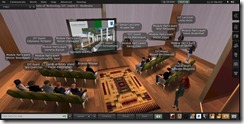 3D Web is the set of technologies that put user browsers in an online, interactive 3D environment.
3D Web is the set of technologies that put user browsers in an online, interactive 3D environment.
Complexity indicates we are onto something.
We had Is One Life Enough class today and I had an “aha” experience.
Q: Is Facebook as hard as Second Life?
A: Yes
Q: Is that a good thing or a bad thing?
A: After the “aha,” I see it as a good thing.
Second Life is hard to learn because it is complex. Complexity is “simple things repeated.” My insight today, after learning how to join the Is One Life Enough private Facebook group, is that Facebook is more complex than complicated. Like Second Life, Facebook rewards you more after you learn it.
Discussion
Facebook combines features of previous, simpler social media tools into one, more complex tool. It offers: 1) instant messaging, 2) events / invitations, 3) bulletin boards / discussions, 4) photo /video sharing, and 5) embedded content from / links to external blogs and tweets.
What does that have to do with Second Life?
Facebook is a two-dimensional social networking application (aka “Web 2.0”) that has been duplicating / absorbing many, but not all, of the most popular 2D capabilities into one tool. “Not all,” for example, because Facebook does not have Skype equaled or beat on voice conferencing.
Second Life is a three-dimensional social networking application. Second Life is “3D” because, in addition to providing users the ability to generate, consume, and interact with each other using text and images (Web 2.0), Second Life provides the added 3D capabilities of, for example, all-angle-all-distance-point-of-view-camera, simplified but powerful, built-in, wireframe-and-texture-person-and-object-modeling-tools, and, again, simplified but powerful, built-in object-animation-and-scripting-tools.
Like Facebook, Second Life started with one technology strength, but has since been expanding to duplicate / absorb others. It now offers additional Internet integration including voice chat and conferencing, media-on-a-prim, web-searchable-SL-content, and web-browser-versus-special-client-based-3d-viewer-technology.
Facebook and Second Life both seek to integrate multiple social networking tool capabilities into one, combined, more complex multi-tool. Facebook is inherently “Web 2.0.” Second Life is not only inherently “3D Web,” it (currently) defines 3D Web.
Conclusion
Facebook and Second Life are both “hard,” yes… but they are hard to learn, not to use. They are both more complex than they are complicated. Something complex is hard to learn to use, but rewards you with power after you learn. Something complicated is hard to use even after you learn, because it is unnecessarily difficult.
Complexity often indicates we are onto something; something workable, learnable, new; something that extends our abilities and reach.
October 17, 2010 at 12:34 pm
I was researching another topic for class and just found this Second Life versus Facebook comparison:
Facebook Now in Similar Position With Consumers and Competitors as Second Life, Says Former Linden Lab VP